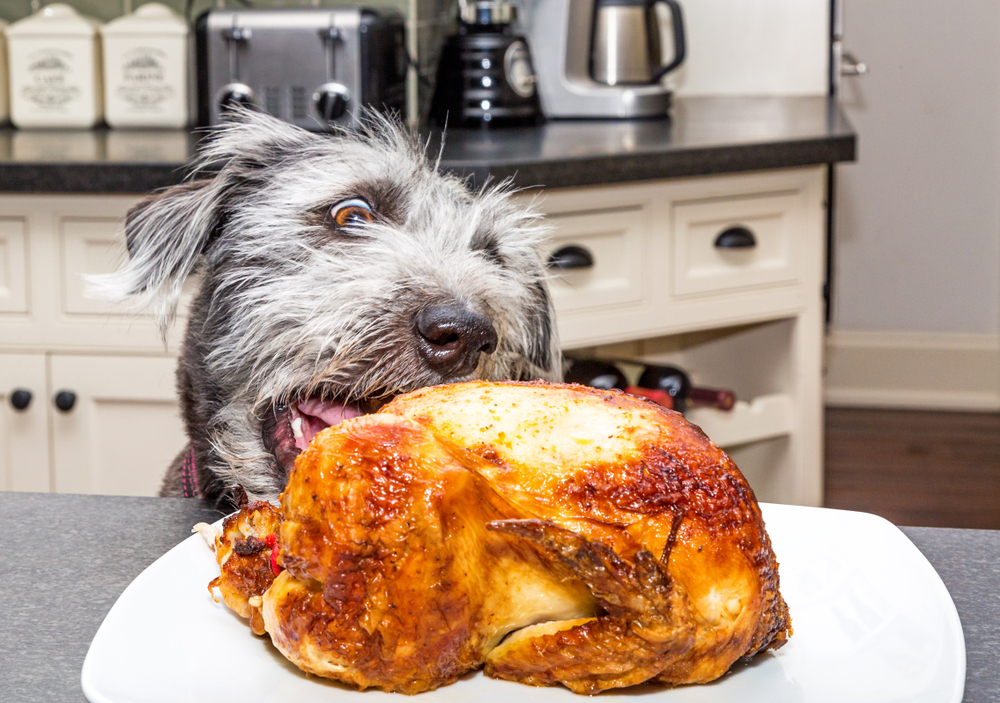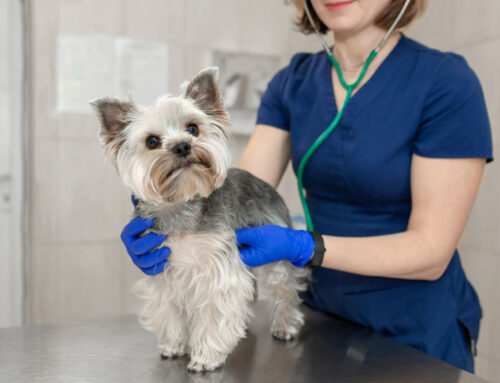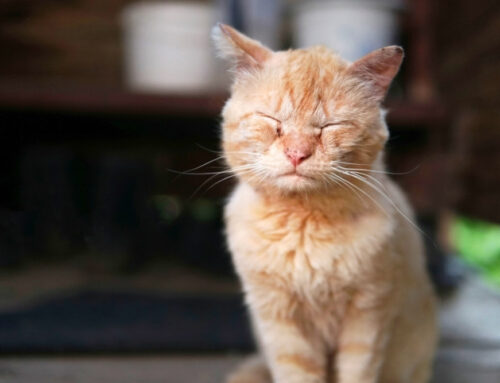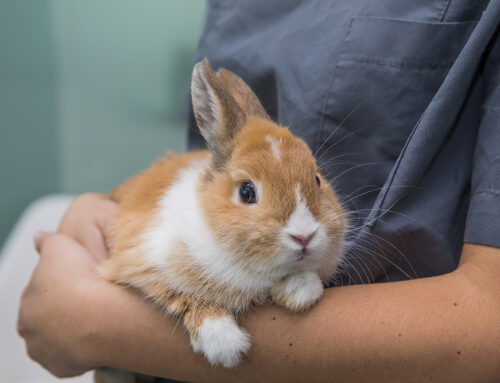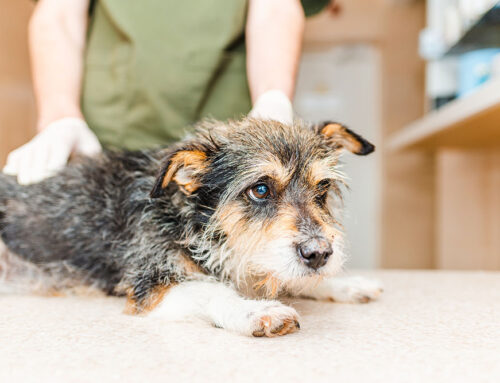If you’re planning to overindulge at Thanksgiving this year, you aren’t alone. Most people eat a bit too much on this holiday in celebration of gratitude and family. While this is OK for humans, eating too many goodies can be dangerous for pets in a number of ways. The Parker Center Animal Clinic team wants pet owners to prepare for potential dangers this year and learn how to avoid the most common holiday pet pitfalls. Here is our list of Thanksgiving hazards that pets must avoid.
#1: Fatty foods
Any sudden change in a pet’s regular diet can cause stomach upset, including vomiting or diarrhea. Fatty foods are dangerous because of their propensity to cause pancreatitis, a painful inflammatory condition of the pancreas. Not every pet who eats a fatty meat scrap will suffer from pancreatitis, but some are at higher risk than others, including miniature schnauzers, who are particularly prone to this condition, and pets with existing diabetes, liver disease, or adrenal problems.
Pancreatitis signs include severe vomiting, inappetence, diarrhea, lethargy, fever, and abdominal pain. Many pets can recover from pancreatitis after an intensive care hospital stay, but some will experience complications, such as clotting problems or organ failure, that lead to death.
#2: Garlic and onions
Garlic, onions, and related plants from the allium family contain compounds that damage red blood cells and their hemoglobin-carrying capacity, which causes hemolytic anemia, where the body destroys the affected cells. Pets severely affected may require blood transfusions. Notably, cats are more susceptible to these effects than dogs, but any pet can suffer ill effects.
#3: Turkey or ham bones
Many people who carve the holiday turkey or ham are tempted to offer their pets meat bones to chew, but cooked bones can present serious health dangers. Turkey bones are damaged during cooking and are more likely to crack and splinter, rather than slowly wearing down as pets chew them. Pets who swallow jagged bone shards can suffer from internal perforation or stomach or intestinal blockage, which can become life-threatening and necessitate emergency surgery.
#4: Desserts
Holiday desserts may contain multiple toxic ingredients with varying negative effects. The most common culprits include:
- Chocolate — Chocolate contains compounds that overstimulate the nervous system and can lead to seizures, heart problems, or death.
- Raisins — Raisins cause kidney failure in dogs, which may not become apparent for several days after ingestion.
- Xylitol — This artificial sweetener causes a massive insulin release, and blood glucose plummets to dangerously low levels. Liver failure can also occur.
- Macadamia nuts — The toxic compound in these nuts is unknown, but pets who ingest them can vomit, have diarrhea, and find walking difficult.
#5: Trash
Ingesting food scraps or non-food trash items, such as meat trussings or corn cobs, can lead to many gastrointestinal (GI) consequences, including vomiting, diarrhea, pancreatitis, or foreign body obstructions. The trash from a large meal is particularly tempting, and most pets won’t hesitate to sneak a sampling if you turn your back.
#6: Turkey brine
Brining a turkey is one trend for preparing the Thanksgiving meal. Once you remove the turkey, you’re left with a vat of tasty, turkey-flavored liquid that pets find extremely attractive. However, the liquid is too salt-saturated for pets and can cause salt toxicosis. Elevated salt in the bloodstream can cause vomiting, diarrhea, dehydration, electrolyte disturbances, and brain swelling.
#7: Decorative plants
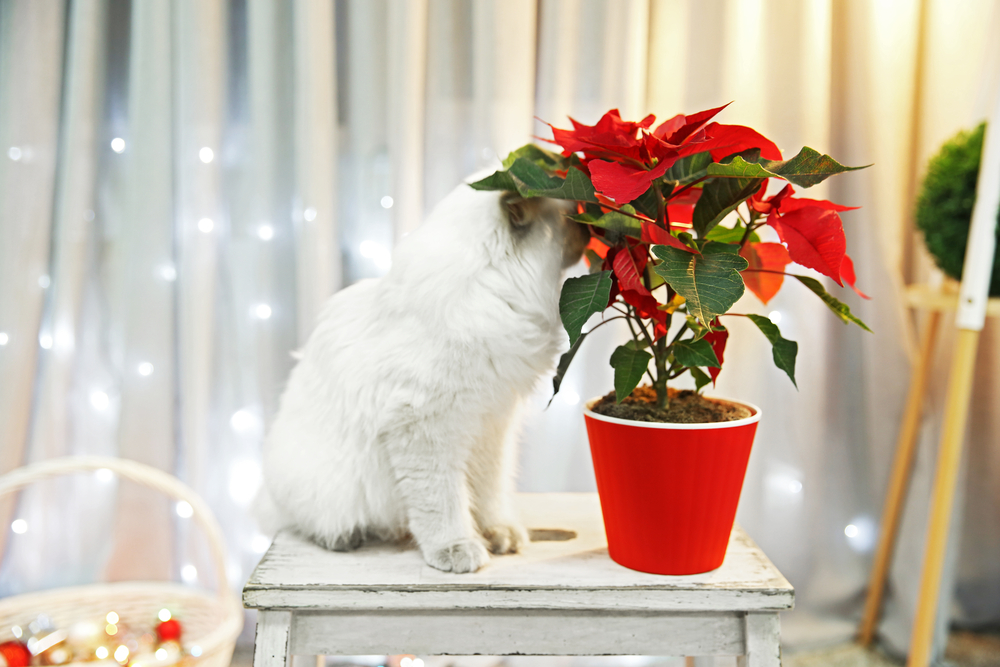
Some decorative plants popular around the holidays are toxic to pets. The most harmful are lilies, which cause kidney failure in cats who have ingested incredibly minuscule amounts—this includes simply contacting the pollen and grooming it off their fur. Another common but harmful problem included in many fall bouquets is bittersweet. Generally speaking, if you have a curious pet who could chomp on your decorative foliage, use faux plants. You can consult the ASPCA list of toxic and non-toxic plants to determine the safest live flowers and plants for your home.
Keeping these items out of your pet’s reach during the holiday will greatly reduce their chances of a Thanksgiving emergency, but accidents happen. For help with a toxic food ingestion or other poisoning, first contact the ASPCA Animal Poison Control Center or Pet Poison Helpline. Then, seek veterinary care with our Parker Center Animal Clinic team or your nearest veterinary emergency facility. Contact us anytime if you have questions about toxic foods or keeping pets safe during the holiday season.


